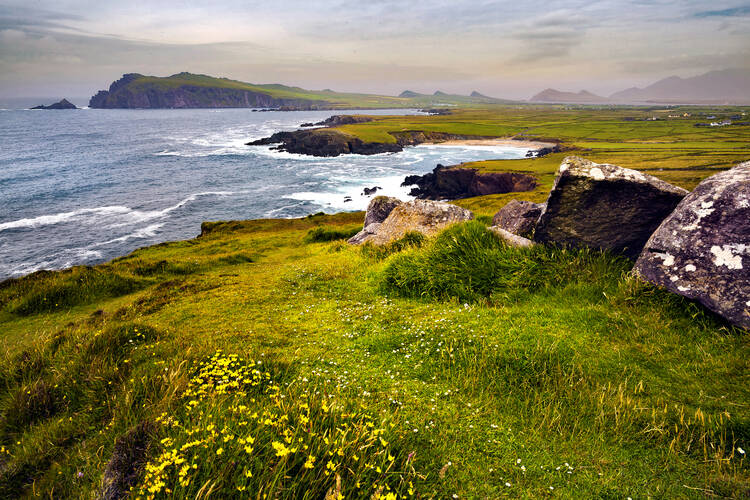The untamed landscape of Ireland’s western coastline comes alive in the writings of the late John O’Donohue, an Irish priest, poet and author. There, in what he called a “crucible of Celtic Christianity,” O’Donohue’s writing style was forged, fusing his doctoral studies on Hegelian philosophy and his experience as a Catholic priest for 19 years with his observances of the mystery and beauty of the natural world—an essential element of the Celtic spiritual tradition.
In his 1996 book, Anam Cara: A Book of Celtic Wisdom, O’Donohue, who died in 2008, describes his search for God in the terrain: “Each stone has a different face. Often the angle of the light falls gently enough to bring out the shy presence of each stone. Here it feels as if a wild, surrealistic God laid down the whole landscape.”
I was introduced to O’Donohue’s work just before I set out for “Erasmus” (a more formal way of saying “study abroad”) at Trinity College Dublin during my undergraduate studies. In the semester before I left, as the eagerness and anxieties about living abroad began to flare, one of my English professors introduced me to O’Donohue through his concept of “thresholds.” I left her office hours with a copy of one of O’Donohue’s collections, To Bless The Space Between Us:A Book of Blessings. In it, he writes, “it is wise in your own life to be able to recognize and acknowledge the key thresholds; to take your time; to feel all the varieties of presence that accrue there.” That spring, as I sat restlessly on my flight from Boston to Dublin, O’Donohue’s words felt poignant and true: “The time has come to cross.”
Born the youngest of four children in 1956, O’Donohue was raised along the harsh coast of the Irish Sea in the Burren region of western Ireland. In an interview for the podcast “On Being with Krista Tippett,” O’Donohue said that growing up in this environment was like existing in an “ancient conversation between the ocean and the stone.”
O’Donohue knits together the Celtic and Judeo-Christian philosophical and theological traditions, bringing them into dialogue with one another through prose poetry and short essays. Who, and perhaps more importantly, where is God? O’Donohue asks. His enchantment with the natural world is made manifest in his writings, which focus on how paying attention to the outer landscape of our world cultivates the inner landscape of our soul.
O’Donohue postulates that we feel the most alive in the presence of what is beautiful. In Divine Beauty: The Invisible Embrace, he writes that beauty is “not just in the eye of the beholder” but that “if our style of looking becomes beautiful, then beauty will become visible and shine forth for us.” Beauty surrounds us “like a great mystery,” and when we discover it or notice it, beauty enlivens us because “the beautiful meets the needs of our soul.”
Much like how Julian of Norwich described the consistent and intimate loving presence of God, so too does O’Donohue insist that God intimately surrounds us via the natural world. God balances between the infinite mystery, something entirely unknowable, and the tangible landscape of beauty, something we only catch glimmers of when we, as O’Donohue explained to Tippet, “are really paying attention.” Here, beauty is just another name for God. Thus when we are experiencing beauty—O’Donohue names art, music and nature as examples in this interview—we are coming “into the fullness of who we are,” of God who made us to be. When we notice the beautiful around us, we see God.
O’Donohue sees his poems and writings as a means to access the beauty of the ordinary. He told Tippet that readers of poetry “draw alongside the mystery [of God] as it is emerging.” By creating what he called “a pedagogy of interiority” in his collection of works, O’Donohue proves that he is not just a gifted contemplative writer but also a cartographer of the soul, mapping how the soul desires and discovers beauty since “beauty is our human calling.” O’Donohue has crafted a field guide for exploring the confusions and longings of our times. His poetic themes cover the journey of our earthly lives, writing about birth, life transitions and death, all while asking: How does the soul find beauty?
Anam Cara, meaning “soul friend” in Gaelic, is O’Donohue’s most popular text. O’Donohue states that one of the ways we desire beauty/God is in the holiness of community. Community is something that our soul longs for, O’Donahue insists, writing that “to be holy is to be home, to be able to rest in the house of belonging that we call the soul.” The sacramental principle of the Celtic spiritual tradition holds that everything is sacred because nothing falls outside the bounds of God’s love and grace. There is no divide between the secular and the sacred, the banal and wonderful, because God is always at work. The spiritual writer Esther De Waal aptly describes it in her book Every Earthly Blessing: “The Celtic approach to God opens up a world in which nothing is too common to be exalted and nothing is so exalted that it cannot be made common.”
In To Bless The Space Between Us, O’Donohue notes that “though we know one another’s names and recognize one another’s faces, we never know what destiny shapes each life.” The same mystery that surrounds an unknowable God is the mystery that creates our human lives. He continues: “The script of individual destiny is secret; it is hidden behind and beneath the sequence of happenings that is continually unfolding for us.” Thus, when we notice the beauty “hidden behind and beneath” the ordinary, we discover more of what our soul longs for.
O’Donohue died unexpectedly in 2008 at age 52, and at the time, he had been reportedly working on a major book on the teachings of the German mystical writer Meister Eckhart. In many of his published writings, O’Donohue wrestled with Eckhart’s notion that “if one knows anything in God and affixes any name to it, that is not God.”
In his interview with Tippet, one of the last interviews he gave before his death, O’Donohue insisted that when we comprehend that we will never fully know God, our “whole heart wakens up” to the beauty around us as we try to glimpse God in the everyday.
And for those who struggle to attune themselves to the beauty of our everyday lives, O’Donohue’s poem “For a New Beginning” offers timeless encouragement:
Awaken your spirit to adventure
Hold nothing back, learn to find ease in risk
Soon you will home in a new rhythm
For your soul senses the world that awaits you.




